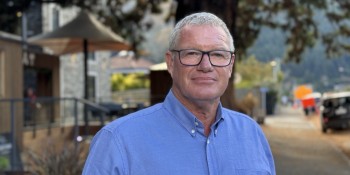Who's helping keep hospo hotspots staffed?

Many hospitality businesses are still short-staffed, but not nearly as badly as they were not so long ago.
That is one of the key takeaways from the latest quarterly labour market snapshot report for Queenstown Lakes.
Hospitality employment is now back to 85 percent of its pre-Covid level, compared with just 67 percent a year ago.
"Not surprisingly, this has led to small increases in opening hours," the report says.
There are now 2,500 additional jobs locally compared to one year ago - a rise of more than 11 percent.
While the reports says demand for workers remains high, as evident by job ads, fewer businesses are reporting difficulties finding workers.
There has been a sharp lift in the availability of workers in the district during the quarter, with employers tapping into previously under-utilised parts of the labour market - women and high school pupils are highlighted in the report - as well as an influx of working holidaymakers over summer.
So, why the rise in women in the workforce? Report author and economist Benje Patterson says the increased cost of living pushing households to seek additional income will go some way to explaining this trend.
"Households who purchased the median house one year ago in Queenstown-Lakes are now facing a more than $400 per week lift in mortgage repayments."
Mr Patterson cautions there remains challenges ahead for businesses.
“Not all is roses. Signs are mounting of a profit squeeze for businesses, which has led to wages not rising as fast as they were. Retaining staff as we move towards the winter season will now be the big challenge, particularly as it is getting harder to just write bigger pay cheques and housing availability remains tight.
“Increasingly, good employers are finding other ways to encourage people to stay by fostering a great workplace environment.”
There are mixed messages about how happy local workers are with their lot.
While Mr Patterson’s latest report highlights data that reflects worker sentiment in the district is slightly better than the national average for tourism and hospitality workers, there is some evidence from the Queenstown Lakes District Council’s Quality of Life survey that sentiment has deteriorated amongst local workers over recent years.
"The data on worker sentiment currently available in Queenstown-Lakes only scratches the surface of what is needed to properly understand the experience of workers in our district.
"Anything employers can do to lift their employment practice is beneficial not just to their own workforce retention, but also to the long-term reputation of Queenstown-Lakes as a desirable place to live and work.
"Given our high reliance on itinerant labour, we want our workers to not only stick around longer, but to also champion our district and key employers to their mates who might be considering an experience away from home."
Mr Patterson is calling for an increased focus on evidence to monitor employee sentiment and its drivers in the district, consistent with the government and tourism industry partnership’s commitment to a nationwide monitoring and evaluation framework in its ‘Better Work Action Plan’.
Queenstown Business Chamber of Commerce chief executive Sharon Fifield says funding towards implementation of the ‘Better Work Action Plan’ has been announced in Budget 2023 and includes an accreditation scheme to encourage employer best practice.
It is her view MahiQL, a district-wide workforce strategy and planning initiative led by the chamber, would be the "perfect partner for government to design, test and pilot the nationwide approach”.
She agrees investment in employee satisfaction is vital in today’s competitive environment, with an ongoing headache for employers wanting happy employees is ensuring workers have stable place to call home.
"We are building up to a busy winter season and worker accommodation still remains a challenge," Ms Fifield says.
"It's promising to see so many businesses working to find solutions to ease pressures for their staff, as ultimately having a healthy, secure and affordable place to live is essential for attracting and retaining staff.”
QLDC Economic Development Manager Peter Harris says it is "heartening to see more vacancies being filled".
The trick now is encouraging those workers to choose to stay in the district
"Alongside the practicalities of work, how people feel about their job and the team they work in plays an important part in whether staff stay or move on," he says.
Keen to read the labour market snapshot report in full? Find it here on the council's website.



























